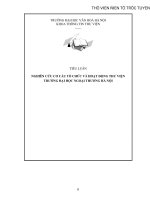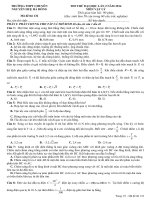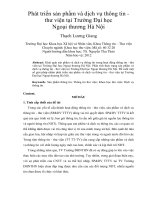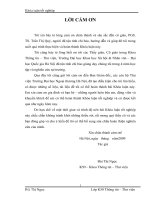Tải Đề thi thử THPT Quốc Gia lần 2 năm 2019 môn Tiếng Anh trường Đại học Ngoại Thương Hà Nội - Đề thi THPT Quốc Gia môn Tiếng Anh có đáp án
Bạn đang xem bản rút gọn của tài liệu. Xem và tải ngay bản đầy đủ của tài liệu tại đây (111.43 KB, 10 trang )
<span class='text_page_counter'>(1)</span><div class='page_container' data-page=1>
<b>ĐỀ THI THỬ THPT QUỐC GIA MÔN TIẾNG ANH</b>
<b>NĂM 2019 CÓ ĐÁP ÁN</b>
<i><b>Mark the letter A, B, C, or D on your answer sheet to indicate the word that differs from </b></i>
<i><b>the other three in the position of primary stress in each of the following questions. </b></i>
<b>Question 1: </b> <b>A. </b>enroll <b>B. </b>promote <b>C. </b>require <b>D. </b>danger
<b>Question 2: </b> <b>B. </b>optimistic <b>B. </b>diversity <b>C. </b>environment <b>D. </b>assimilate
<i><b>Mark the letter A, B, C, or D on your answer sheet to indicate the word whose underlined </b></i>
<i><b>part differs from the other three in pronunciation in each of the following questions. </b></i>
<b>Question 3: </b> <b>A. </b>terrified <b>B. </b>influenced <b>C. </b>averaged <b>D. </b>accompanied
<b>Question 4: </b> <b>A. </b>identify <b>B. </b>final <b>C. </b>applicant <b>D. </b>decide
<i><b>Mark the letter A, B, C, or D on your answer sheet to indicate the underlined part that </b></i>
<i><b>needs correction in each of the following questions. </b></i>
<b>Question 5: </b>He bought a lot of books, none of them he has ever read.
<b>A.</b> bought <b>B.</b> none of <b>C.</b> them <b>D.</b> has ever read
<b>Question 6: </b>There is a few evidence that the children in language classrooms learn foreign
languages any better than adults in similar classroom situation.
<b>A.</b> few evidence <b>B.</b> in language classrooms
<b>C.</b> better <b>D.</b> classroom situation
<b>Question 7: </b>The theory isn't sounding persuasive anymore because it has been opposed by
many scholars.
<b>A.</b> isn't sounding <b>B.</b> anymore <b>C.</b> has been opposed <b>D.</b> scholars
<i><b>Mark the letter A, B, C, or D on your answer sheet to indicate the correct answer to each </b></i>
<i><b>of the following questions. </b></i>
<b>Question 8: </b>The babysitter has told Billy's parents about his _______ behavior and how he
starts acting as soon as they leave home.
</div>
<span class='text_page_counter'>(2)</span><div class='page_container' data-page=2>
<b>Question 9: </b>_______as a masterpiece, a work of art must transcend the ideals of the period
in which it was created.
<b>A. </b>In order to be ranking <b>B. </b>Ranking
<b>C. </b>Being ranked <b>D. </b>To be ranked
<b>Question 10: </b>Every _______ piece of equipment was sent to the fire.
<b>A. </b>disposable <b>B. </b>consumable <b>C. </b>spendable <b>D. </b>available
<b>Question 11: </b>Smith had a lucky escape. He _______ killed.
<b>A. </b>shouldn’t have been <b>B. </b>should have been <b>C. </b>must have been <b>D. </b>could have
been
<b>Question 12: </b>Neither of the boys came to school yesterday, __________?
<b>A. </b>didn’t they <b>B. </b>does they <b>C. </b>did they <b>D. </b>doesn’t they
<b>Question 13: </b>A good leader in globalization is not to impose but change.
<b>A. </b>facilitate <b>B. </b>show <b>C. </b>cause <b>D. </b>oppose
<b>Question 14: </b>The old man warned the young boys _______ in the deep river.
<b>A. </b>not to swimming <b>B. </b>don’t swim <b>C. </b>to swim <b>D. </b>against
swimming
<b>Question 15: </b>His father used to be a _______ professor at the university. Many students
worshipped him.
<b>A. </b>distinguishing <b>B. </b>distinct <b>C. </b>distinctive <b>D. </b>distinguished
<b>Question 16: </b>If Tim _______ so fast, his car wouldn't have crashed into a tree.
<b>A. </b>haven’t driven <b>B. </b>didn’t drive <b>C. </b>drives <b>D. </b>hadn’t driven
<b>Question 17: </b>Most of the_______ in this workshop do not work very seriously or
productively.
<b>A. </b>rank and file <b>B. </b>tooth and nail <b>C. </b>eager beavers <b>D. </b>old hands
<b>Question 18: </b>Not only _______ in the field of psychology but animal behavior is examined
as well.
<b>A. </b>is human behavior studied <b>B. </b>is studied human behavior
</div>
<span class='text_page_counter'>(3)</span><div class='page_container' data-page=3>
<b>Question 19: </b>Luckily, the rain ______ so we were able to play the match.
<b>A. </b>watered down <b>B. </b>gave out <b>C. </b>got away <b>D. </b>held off
<i><b>Mark the letter A, B, C, or D on your answer sheet to indicate the word(s) CLOSEST in </b></i>
<i><b>meaning to the underlined word(s) in each of the following questions. </b></i>
<b>Question 20: </b>Technological changes have rendered many traditional skill <i><b>obsolete</b></i>.
<b>A. </b>outdated <b>B. </b>impractical <b>C. </b>unappreciated <b>D. </b>undeveloped
<b>Question 21: </b>By being <i><b>thrifty </b></i>and shopping wisely, housewives in the city can feed an
entire family on as little as 500.000 VND a week.
<b>A. </b>luxurious <b>B. </b>economical <b>C. </b>sensible <b>D. </b>miserable
<i><b>Mark the letter A, B, C, or D on your answer sheet to indicate the word(s) OPPOSITE in </b></i>
<i><b>meaning to the underlined word(s) in each of the following questions. </b></i>
<b>Question 22: </b>Research suggests that children are more <i><b>resilient </b></i>than adults when it comes to
getting over an illness.
<b>A. </b>becoming much stronger <b>B. </b>becoming healthy again
<b>C. </b>making a slow recovery <b>D. </b>making a quick recovery
<b>Question 23: </b>Blue is <i><b>an old hand </b></i>at such compositions and has never had any trouble with
them.
<b>A. </b>relaxed about <b>B. </b>reserved about <b>C. </b>uninterested in <b>D. </b>inexperienced in
<i><b>Mark the letter A, B, C, or D on your answer sheet to indicate the option that best </b></i>
<i><b>completes each of the following exchanges. </b></i>
<b>Question 24: </b>Tony and Bob are talking in their classroom.
- <b>Tony: </b>“We are buying Lily a graduation present.”
- <b>Bob:</b>” _______”
<b>A. </b>She’s out of my league. <b>B. </b>Can you all be more down-to-earth?
<b>C. </b>I’m ranking in money now. <b>D. </b>Could I chip in?
</div>
<span class='text_page_counter'>(4)</span><div class='page_container' data-page=4>
<b>A. </b>I love checking out the shops for new clothes.
<b>B. </b>None. Been starved since 9 yesterday.
<b>C. </b>I hate shopping.
<b>D. </b>Nothing special. Just some photos I took on the trip to Nepal.
<i><b>Read the following passage and mark the letter A, B, C, or D on your answer sheet to </b></i>
<i><b>indicate the correct word or phrase that best fits each of the numbered blanks from 26 to </b></i>
<i><b>30. </b></i>
Urbanisation programmes are being carried out in many parts of the world, especially
in densely (26) ________ regions with limited land and resources. It is the natural outcome
of economic development and industrialisation. It has brought a lot of benefits to our society.
However, it also (27) ________ various problems for local authorities and town planners in
the process of maintaining sustainable urbanization, especially in developing countries.
When too many people cram into a small area, urban infrastructure can't be effective.
There will be a (28) ________ of livable housing, energy and water supply. This will create
overcrowded urban districts with no proper facilities. Currently, fast urbanization is taking
place predominantly in developing countries where sustainable urbanization has little
relevance to people's lives. Their houses are just shabby slums with poor sanitation. Their
children only manage to get basic education. Hence, the struggle for (29) ________ is their
first priority rather than anything else. Only when the quality of their existence is improved,
can they seek (30) ________ other high values in their life.
<b>Question 26: A. </b>popular <b>B. </b>crowed <b>C. </b>populated <b>D. </b>numerous
<b>Question 27: A. </b>poses <b>B. </b>offers <b>C. </b>leads <b>D. </b>imposes
<b>Question 28: A. </b>appearance <b>B. </b>plenty <b>C. </b>loss <b>D. </b>lack
<b>Question 29: A. </b>survive <b>B. </b>survival <b>C. </b>survivor <b>D. </b>survived
<b>Question 30: A. </b>about <b>B. </b>for <b>C. </b>with <b>D. </b>on
<i><b>Read the following passage and mark the letter A, B, C, or D on your answer sheet to </b></i>
<i><b>indicate the correct answer to each of the questions from 31 to 38. </b></i>
</div>
<span class='text_page_counter'>(5)</span><div class='page_container' data-page=5>
thousand times a day the difference between the language he uses and the language <b>those </b>
around him use. Bit by bit, he makes the necessary changes to make his language like other
people’s. In the same way, children learn all the other things they learn to do without being
taught – to talk, run, climb, whistle, ride a bicycle – compare their own performances with
those of more skilled people, and slowly make the needed changes. But in school we
never give a child a chance to find out his mistakes for himself, let alone correct them.
We do it all for him. We act as if we thought that he would never notice a mistake unless it
was pointed out to him, or correct it unless he was made to. Soon he becomes dependent on
the teacher. Let him do it himself. Let him work out, with the help of other children if he
wants it, what this word says, what the answer is to that problem, whether this is a good way
of saying or doing this or not.
If it is a matter of right answers, as it may be in mathematics or science, give him the
answer book. Let him correct his own papers. Why should we teachers waste time on such
routine work? Our job should be to help the child when he tells us that he can’t find the way
to get the right answer. Let’s end all this nonsense of grades, exams, and marks. Let us throw
them all out, and let the children learn what all educated persons must someday learn, how to
measure their own understanding, how to know what they know or do not know.
Let them get on with this job in the way that seems most sensible to them, with our
help as school teachers if they ask for it. The idea that there is a body of knowledge to be
learnt at school and used for the rest of one’s life is nonsense in a world as complicated and
rapidly changing as ours. Anxious parents and teachers say, “But suppose they fail to learn
something essential, something they will need to get on in the world?” Don’t worry! If it is
<b>essential</b>, they will go out into the world and learn it.
<b>Question 31: </b>What does the author think is the best way for children to learn things?
<b>A. </b>By listening to explanations from skilled people <b>B. </b>By copying what other people do
<b>C. </b>By asking a great many questions <b>D. </b>By making mistakes and having them corrected
<b>Question 32: </b>The passage suggests that learning to speak and learning to ride a bicycle are
_______.
</div>
<span class='text_page_counter'>(6)</span><div class='page_container' data-page=6>
<b>B. </b>basically different from learning adult skills
<b>C. </b>not really important skills
<b>D. </b>more important than other skills
<b>Question 33: </b>What does the author think teachers do which they should not do?
<b>A. </b>They give children correct answers
<b>B. </b>They allow children to mark their own work
<b>C. </b>They encourage children to copy from one another
<b>D. </b>They point out children’s mistakes to them
<b>Question 34: </b>The word “<i><b>those</b></i>” in paragraph 1 refers to ___________.
<b>A. </b>skills <b>B. </b>people <b>C. </b>changes <b>D. </b>things
<b>Question 35: </b>According to paragraph 1, what basic skills do children learn to do without
being taught?
<b>A. </b>Reading, talking and hearing <b>B. </b>Talking, climbing and whistling
<b>C. </b>Running, walking and playing <b>D. </b>Talking, running and skiing
<b>Question 36: </b>Exams, grades and marks should be abolished because children’s progress
should only be
estimated by __________.
<b>A. </b>parents <b>B. </b>educated persons <b>C. </b>the children themselves <b>D. </b>teachers
<b>Question 37: </b>The word “<i><b>essential</b></i>” in paragraph 3 is closest in meaning to ___________.
<b>A. </b>wonderful <b>B. </b>important <b>C. </b>complicated <b>D. </b>difficult
<b>Question 38: </b>The author fears that children will grow up into adults who are ___________.
<b>A. </b>too critical of themselves <b>B. </b>unable to use basic skills
<b>C. </b>too independent of others <b>D. </b>unable to think for themselves
<i><b>Read the following passage and mark the letter A, B, C, or D on your answer sheet to </b></i>
<i><b>indicate the correct answer to each of the questions from 39 to 43. </b></i>
</div>
<span class='text_page_counter'>(7)</span><div class='page_container' data-page=7>
Americans or African-Americans. Males suffer accidents at more than twice the rate of
females, in part because they are more prone to risky behavior. Alaskans are more than three
times as likely as Rhode Islanders to die in an accident. Texans are twenty-one times more
likely than New Jerseyites to die in a natural disaster. Among the one hundred most
populous counties, kern County, California (Bakersfield), has an accident fatality rate three
times greater than Summit County, Ohio (Akron).
Accidents happens more often to poor people. Those living in poverty receive
<i><b>inferior </b></i>medical care, are more apt to reside in houses with faulty heating and electrical
systems, drive older cars with fewer safety features, and are less likely to use safety belts.
People in rural areas have more accidents than city or suburban dwellers because farming is
much riskier than working in a factory or office and because emergency medical services are
less readily available. These two factors – low income and rural residence – may explain
why the south has a higher accident rate than the north.
<b>Question 39: </b>Which of the following is TRUE according to the passage?
<b>A. </b>Children aged five to nine face the greatest accident risk.
<b>B. </b>All people face an equal risk of having an accident.
<b>C. </b>One in every 22 people aged 85 and over will die in an accident.
<b>D. </b>The risk of having an accident is greater among certain groups of people.
<b>Question 40: </b>The word "<i><b>inferior</b></i>" in the passage is closest in meaning to ______.
<b>A. </b>modern <b>B. </b>low-quality <b>C. </b>well-equipped <b>D. </b>unsafe
<b>Question 41: </b>According to the passage, which of the following groups of people in America
face the highest
risk of having an accident?
<b>A. </b>Native Americans <b>B. </b>Asian-Americans <b>C. </b>White Americans <b>D. </b>
African-Americans
<b>Question 42: </b>What does the word "<i><b>that</b></i>" in the passage refer to?
<b>A. </b>males <b>B. </b>native Americans <b>C. </b>the risk <b>D. </b>Afirican-Americans
</div>
<span class='text_page_counter'>(8)</span><div class='page_container' data-page=8>
<b>A. </b>Little knowledge about safety
<b>B. </b>Inadequate medical services
<b>C. </b>Poor housing and working conditions
<b>D. </b>Use of cars which incorporate fewer safety features
<i><b>Mark the letter A, B, C, or D on your answer sheet to indicate the sentence that is closest </b></i>
<i><b>in meaning to each of the following questions.</b></i>
<b>Question 44: </b>It was not until after I got home that I realized I had not set the burglar alarm
in the office.
<b>A. </b>Fortunately, I realized that I hadn’t set the burglar alarm just before I left for home;
otherwise, I would have had to travel all the way back to the office.
<b>B. </b>On the way home, I suddenly realized that I had forgotten to turn on the burglar alarm
in the office.
<b>C. </b>I didn’t turn the burglar alarm on before I left the office, but I only became aware of this
after I’d arrive home.
<b>D. </b>I wish I had realized before I arrived home that I hadn’t turn on the burglar alarm in the
office, then it would have been easier to go and set it.
<b>Question 45: </b>Phil wanted to be separated from his family on the business trip for less time
than he was on the last.
<b>A. </b>As he had enjoyed being away from his family for such a long time on his last business
trip, Phil hoped that this trip would be even longer.
<b>B. </b>Phil knew that the business trip he was soon to take would keep him away from his
family for less time than the previous one.
<b>C. </b>On this business trip, Phil hoped that he would not be away from his family for as long
a time as he had been on the previous one.
<b>D. </b>No longer wanting to take lengthy business trips because they separated him from his
family, Phil preferred not to go on any at all.
</div>
<span class='text_page_counter'>(9)</span><div class='page_container' data-page=9>
<b>A. </b>The traffic is always so heavy that you’d better walk to work; it’s quicker.
<b>B. </b>There is so much traffic these days that it is more pleasant to walk than to drive.
<b>C. </b>During rush hours, walking gives me much more pleasure than driving in the heavy
traffic.
<b>D. </b>It is faster to walk than to drive in the heavy traffic at certain time of the day.
<b>Question 47: </b>I'm like my mum, whereas my brother looks like my dad.
<b>A. </b>I’m like my mum, whereas my brother takes after my dad.
<b>B. </b>I’m like my mum, whereas my brother takes over my dad.
<b>C. </b>I’m like my mum, whereas my brother takes on my dad.
<b>D. </b>I’m like my mum, whereas my brother takes in my dad.
<i><b>Mark the letter A, B, C, or D on your answer sheet to indicate the sentence that best </b></i>
<i><b>combines each pair of sentences in the following questions. </b></i>
<b>Question 48: </b>You don't try to work hard. You will fail in the exam.
<b>A. </b>Unless you don’t try to work hard, you will fail in the exam.
<b>B. </b>Unless you try to work hard, you won’t fail in the exam.
<b>C. </b>Unless you try to work hard, you will fail in the exam.
<b>D. </b>Unless do you try to work hard, you will fail in the exam.
<b>Question 49: </b>Marry loved her stuffed animal when she was young. She couldn’t sleep
without it.
<b>A. </b>When Mary was young, she loved her stuffed animal so as not to sleep without it.
<b>B. </b>As Marry couldn’t sleep without her stuffed animal when she was young, she loved it.
<b>C. </b>When Marry was young, she loved her stuffed animal so much that she couldn’t sleep
without it.
<b>D. </b>When Marry was young, she loved her stuffed animal though she couldn’t sleep without
it.
<b>Question 50: </b>"Cigarette?", he said. "No, thanks." I said.
<b>A. </b>He asked for a cigarette, and I immediately refused.
</div>
<span class='text_page_counter'>(10)</span><div class='page_container' data-page=10>
<b>C. </b>He offered me a cigarette, but I promptly declined.
<b>D. </b>He asked if I was smoking, and I denied at once.
<b>ĐÁP ÁN</b>
Question 1 <b>D</b> Question 2 <b>A</b> Question 3 <b>B</b> Question 4 <b>C</b> Question 5 <b>C</b>
Question 6 <b>A</b> Question 7 <b>A</b> Question 8 <b>C</b> Question 9 <b>D</b> Question
10
<b>A</b>
Question 11 <b>D</b> Question 12 <b>C</b> Question 13 <b>A</b> Question
14
<b>D</b> Question
15
<b>D</b>
Question 16 <b>D</b> Question 17 <b>A</b> Question 18 <b>A</b> Question
19
<b>D</b> Question
20
<b>A</b>
Question 21 <b>B</b> Question 22 <b>C</b> Question 23 <b>D</b> Question
24
<b>D</b> Question
25
<b>A</b>
Question 26 <b>C</b> Question 27 <b>A</b> Question 28 <b>D</b> Question
29
<b>B</b> Question
30
<b>B</b>
Question 31 <b>B</b> Question 32 <b>A</b> Question 33 <b>D</b> Question
34
<b>B</b> Question
35
<b>B</b>
Question 36 <b>C</b> Question 37 <b>B</b> Question 38 <b>D</b> Question
39
<b>D</b> Question
40
<b>B</b>
Question 41 <b>A</b> Question 42 <b>C</b> Question 43 <b>A</b> Question
44
<b>C</b> Question
45
<b>C</b>
Question 46 <b>D</b> Question 47 <b>A</b> Question 48 <b>C</b> Question
49
<b>C</b> Question
50
<b>C</b>
</div>
<!--links-->









